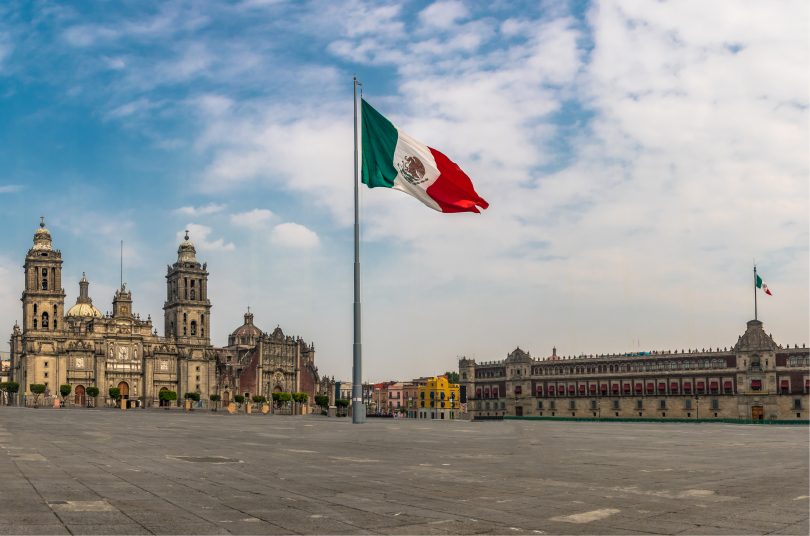The Coronavirus has caused much damage to local economies and businesses, as well as triggering the postponement of events of all kinds, from entertainment to business-oriented to political. Such is the case with Mexico, whose government is once again pushing back its promised legislation to govern the legal use of recreational cannabis.
Much like most of the world, cannabis was illegalized in Mexico in the early 1900’s and stayed that way until 2009. In 2009, Mexico decriminalized a range of drugs including cannabis, instituting personal use laws instead. In the case of cannabis, an individual can possess up to five grams, and above this amount can incur prison time.
Other restrictions include where the marijuana is used, and where it’s not – including close to places like schools. The law also states that if the amount is below five grams, that law enforcement needs to see evidence that it is only for the person in question and that it will be used immediately (however that is done).
All sale and supply activities are illegal in Mexico. According to Mexico’s Federal Criminal Code, supplying drugs can lead to 10-25 years in prison. To say that Mexico has had some problems in the past with powerful and hard-to-control cartel-led drug trafficking, is a vast understatement. Past strategies to get a handle on it, like taking out high-up cartel members, resulted in large death tolls and overall violence. The 2009 decriminalization was part of an attempt to curb trafficking, and trafficking-related crime and violence, by attempting different means.
In terms of growing marijuana, updates to the Federal Criminal Code have essentially decriminalized growing for personal consumption, at least for the first time a person is found doing it. Other instances can still incur prison sentences, but overall the amount of time given has been drastically reduced from what it was in the past.
Use the sign-up form below to subscribe to the CBD Testers Weekly Newsletter
What about medicinal & CBD?
As of 2017, CBD – or cannabidiol – is legal for medicinal use, but with a 1% THC cap in order to be legal. Medications and products with a higher level of THC must be sold with a prescription only.
In June of 2017, a bill passed unanimously through the Mexican Senate and Lower House of Congress. According to the new law, the Ministry of Health was tasked with setting up a regulatory system for the use of medical cannabis.
2015 ruling makes things interesting
Much of the stuff just stated is likely to change soon. And it’s all because of what started with a 2015 court ruling. In November of that year, a ruling was made on a case concerning four individuals – all members of The Mexican Society for Responsible and Tolerant Self-Consumption – who won the ability to have, grow, and transport cannabis. The Supreme Court made the statement that individuals should have the right to grow marijuana for personal use. This didn’t mean an immediate ending to the existing laws, of course, but created a bit of a confusion that led to 2018.
In October of 2018 the Mexican Supreme Court made a couple rulings that changed everything. Both cases had to do with the recreational use of cannabis by an adult, and in both cases the ruling was that a person must be allowed to use, possess, and grow cannabis for recreational purposes. The reason they must be allowed, argued the court in its ruling, is that as personally developed human beings (the right to personal development is a given freedom of the Mexican constitution), people must be able to choose their own recreational activities, and that the government has no right to interfere with this.
Mexico Set to Legalize Recreational Cannabis by the End of the Year
It went on to say that whatever psychoactive effects cannabis has, those are not good enough justification for a complete prohibition of its use. The ruling made clear that this freedom was not absolute and without boundaries, and would still be subject to regulation.
These two rulings were actually the last of five Supreme Court rulings between 2015-2018, and in the Mexican legislative/judicial system, five is the lucky number. According to Mexican law, jurisprudence is established when there are five consecutive supreme court rulings on a specific point, all of which are consistent on that point. When this happens, the ruling becomes binding for lower courts, and the legislative arm of government must then act accordingly in order not to be in opposition to the courts.
What does it mean?
The five Supreme Court decisions didn’t technically legalize marijuana. They made it so that using it, having it, and growing it, is allowed by court. But it doesn’t mean that a person caught breaking the still-existent laws doesn’t have to go through the court system and plead their case. In order for it to be actually legal and not require this, an official law must be established by Congress.
So, in a way it creates a contradiction, even if just a temporary one. The courts can’t very easily rule that a person can’t have, use, or grow recreational cannabis, yet there isn’t actually a law permitting it. Since a contradiction like this can’t exist, the government must update laws to reflect the new change.
Upon the ruling, a need was created for a system to regulate this now non-prohibited industry, and this put the burden on Mexico’s Congress to come up with a structure for recreational cannabis regulation. In order to comply with the ruling, Congress initially had until October of 2019 to establish a law.
Mexico’s Health Ministry Ordered To Clarify Medical And Recreational Cannabis Status
Multiple postponements
Putting together the legal framework to regulate new markets is a big task, and often takes years from the time a law passes to when it can effectively be used. In the case of Mexico and cannabis legalization, the change in status came through court rulings, not through draft legislation, making Congress have to catch up to something it hadn’t even started. Even so, it certainly wasn’t done in the original amount of time given.
At the end of 2019, the Supreme Court allowed for a six-month extension for Congress to create and approve legislation to govern legal cannabis. That gave the government until the end of April. Apparently, that was still not enough time, and while different approaches have been introduced, ultimately negotiations have not been fruitful.
When the April deadline came up a few weeks ago, the Supreme Court once again instituted a postponement for the government, giving it until December 15, another 7.5 months. This time around, the Coronavirus has been fingered as the culprit, causing yet another delay in general life functioning.
What will it look like?
Although there has been enough debate to cause this much delay, lawmakers are getting closer to a uniform decision, with the most recent revision of the bill gaining more approval. While its still very much in draft stages, this new structure has the following provisions:
- Anyone 18+ can have and grow marijuana for personal use.
- Individuals can grow up to 20 plants (or the equivalent max of 480 grams per year/yield).
- Individuals can have up to 28 grams legally, but decriminalized up to 200 grams.
- There is a 12% tax on marijuana products with a portion going to substance abuse treatment.
- Smoking in public is legal so long as the area isn’t a designated smoke-free zone.
- The market is regulated by the Mexican Institute of Regulation and Control of Cannabis.
- Hemp and CBD products are not subject to the same regulation as THC products.
Of course, it’s not officially hammered out yet, and some lawmakers still have concerns over things like protection for consumers, and making sure domestic farmers are not cut out. This is an important point since more and more countries that have legalized commercially, are opting to take foreign investments over empowering their own people.
Medical Cannabis Tourism Rising: Virgin Islands, Jamaica, and Thailand Set to Cash In
Conclusion
…And so for now, the cannabis legalization limbo continues in Mexico. If no further delays are made, Mexicans can expect to be freely smoking by year’s end. If things break down again and there are more delays, at the very least, they’ll still know that the new law is on its way.
Thanks for stopping by CBDtesters.co, your hub for all things cannabis-related. Stop by frequently and make sure to subscribe to the CBD Testers Weekly Newsletter to stay up-to-date on today’s biggest stories.







